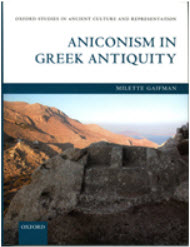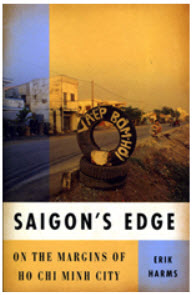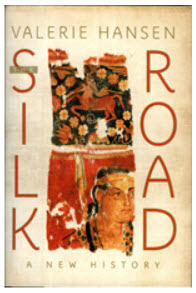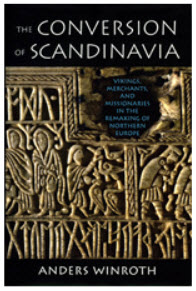Four Faculty Awarded International Book Prizes by The MacMillan Center
August 23, 2013. New Haven, CT — Milette Gaifman, Associate Professor of Greek Art and Archaeology, and Eric Harms, Assistant Professor of Anthropology, were awarded the Gaddis Smith International Book Prize for best first book. Gaifman for Aniconism in Greek Antiquity (Oxford University Press, 2012) and Harms for Saigon’s Edge: On The Margins of Ho Chi Mihn City (University of Minnesota Press, 2012).
Valerie Hansen and Anders Winroth, both Professors of History, were awarded the Gustav Ranis International Book Prize for best book. Hansen for The Silk Road: A New History (Oxford University Press, 2012), and Anders for The Conversion of Scandinavia: Vikings, Merchants, and Missionaries in the Remaking of Northern Europe (Yale University Press, 2012).
 In Aniconism in Greek Antiquity, Gaifman explores a phenomenon known as aniconism – the absence of figural images of gods in Greek practiced religion and the adoption of aniconic monuments, namely objects such as pillars and poles, to designate the presence of the divine. It is the first English volume dedicated specifically to the topic of aniconism in Greek antiquity since 1903 and it is likely to become the standard work on the subject of Greek aniconism.
In Aniconism in Greek Antiquity, Gaifman explores a phenomenon known as aniconism – the absence of figural images of gods in Greek practiced religion and the adoption of aniconic monuments, namely objects such as pillars and poles, to designate the presence of the divine. It is the first English volume dedicated specifically to the topic of aniconism in Greek antiquity since 1903 and it is likely to become the standard work on the subject of Greek aniconism. In Saigon’s Edge, Erik Harms explores life in Hóc Môn, putting forth a revealing perspective on how rapid urbanization impacts the people who live at the intersection of rural and urban worlds. With particular attention to everyday social realities, Harms demonstrates how living on the margin can be both alienating and empowering, as forces that exclude its denizens from power and privilege in the inner city are used to thwart the status quo on the rural edges. Harms’s work also opens a window on Vietnam’s larger turn toward market socialism and the celebration of urbanization.
In Saigon’s Edge, Erik Harms explores life in Hóc Môn, putting forth a revealing perspective on how rapid urbanization impacts the people who live at the intersection of rural and urban worlds. With particular attention to everyday social realities, Harms demonstrates how living on the margin can be both alienating and empowering, as forces that exclude its denizens from power and privilege in the inner city are used to thwart the status quo on the rural edges. Harms’s work also opens a window on Vietnam’s larger turn toward market socialism and the celebration of urbanization. The Silk Road is a fascinating story of archeological discovery, cultural transmission, and the intricate chains across Central Asia and China. In it, Hansen describes the remarkable archeological finds that revolutionized our understanding of these trade routes. Silk was not the most important good on the road; paper had a bigger impact in Europe. Perhaps the most significant of all was the road’s transmission of ideas, technologies, and artistic motifs.
The Silk Road is a fascinating story of archeological discovery, cultural transmission, and the intricate chains across Central Asia and China. In it, Hansen describes the remarkable archeological finds that revolutionized our understanding of these trade routes. Silk was not the most important good on the road; paper had a bigger impact in Europe. Perhaps the most significant of all was the road’s transmission of ideas, technologies, and artistic motifs. In The Conversion of Scandinavia, Winroth argues for a radically new interpretation of the conversion of Scandinavia from paganism to Christianity in the early Middle Ages. Overturning the received narrative of Europe’s military and religious conquest and colonization of the region, he contends that rather than acting as passive recipients, Scandinavians converted to Christianity because it was in individual chieftains’ political, economic, and cultural interests to do so. Through a painstaking analysis and historical reconstruction of both archeological and literary sources, and drawing on scholarly work that has been unavailable in English, Winroth opens up new avenues for studying European ascendency and the expansion of Christianity in the medieval period.
In The Conversion of Scandinavia, Winroth argues for a radically new interpretation of the conversion of Scandinavia from paganism to Christianity in the early Middle Ages. Overturning the received narrative of Europe’s military and religious conquest and colonization of the region, he contends that rather than acting as passive recipients, Scandinavians converted to Christianity because it was in individual chieftains’ political, economic, and cultural interests to do so. Through a painstaking analysis and historical reconstruction of both archeological and literary sources, and drawing on scholarly work that has been unavailable in English, Winroth opens up new avenues for studying European ascendency and the expansion of Christianity in the medieval period.Established in 2004 to recognize the distinguished legacy of two former. Directors of the MacMillan Center, the prizes are awarded for books on international topics written by current members of the Yale faculty. Award recipients receive a research appointment at the MacMillan Center, and a $10,000 research award over two years.
Contact Information:
Marilyn Wilkes
The Whitney and Betty MacMillan Center for International and Area Studies at Yale
(203) 432-3413